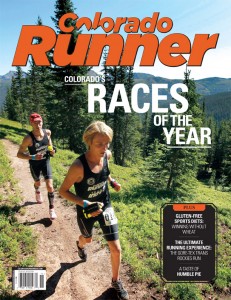A few months ago I participated in my first off-road triathlon in Moab, Utah. At the awards presentation some guy hobbled in as if he’d been shot in the back. If you’ve been to enough races, you’ve seen this scene played out. The announcer stops to acknowledge the courageous effort of the poor sap who crosses a finish line that has since been torn down. A few politely clap, some cheer. Others scratch their heads wondering who That Guy is, and quite frankly, why, and what happened? Never did I anticipate That Guy would be me. But on this day, he was.
In twenty years of competitive sports I’ve won a couple races and certainly my share of age group awards. But things happen in a race. You have a bad day. Just a half mile into the ride my hydration pack went awry spilling sixty-four ounces of cold water down my legs and onto the red sand. No problem, I’ll get by without water. What could go wrong in sixteen miles under a cloudless sky in some of the most unforgiving terrain this side of Mars? Let’s start with massive dehydration. Let’s end with an average speed of 4.3 mph. Yes, you may chuckle. I did. I still get emails from friends asking if I can pace them in their next race.
My face and body were so caked in salt my dog kissed me for three hours. My wife wouldn’t kiss me at all. I didn’t pee for a week and having seen the post races photos I’m still awaiting an endorsement from Morton Salt.
It’s easy to be happy when things go right. Most of us know that feeling. But if you’ve raced enough you’ve probably had That Day when you were That Guy.
And that’s all right. You learn to laugh at your mishaps and laugh at yourself. You know this is one experience along the road. And you recognize that This will likely be the story you tell to your friends around a campfire years later. Nobody really wants to hear about your best day anyway. You can’t laugh at that.
I love the song Bad Day, by Daniel Powter. He sings, “You work at a smile and you go for a ride.” Recognizing my bad situation, that’s exactly what I did. Eight miles in, depleted and humbled, I simply put on a smile and went for a ride.
I felt like Dorothy on the road to Oz, coming across other misfits who needed heart, courage, and in some cases, a brain. I’d say a few kind words and continue on. One point I came across a woman sitting on the side of the road, frustrated at her inability to change a flat tire. I offered my assistance. She was concerned that she was ruining my race. “You’re adding to it,” I said. “Sit there long enough you’re going to need an oil can.” We laughed at our misfortune and wished each other better luck next time. Down the road at an aid station, I came across a war veteran with white hair wearing a NAVY baseball cap – a Wizard of sorts that offered advice. He was a tough, grizzled old man and handed me a Dixie cup of water. “Don’t give up,” he insisted. I got the feeling he’d said that a few times in his life. I was afraid to ask him for another cup. My struggle that day was a joke when I considered his. I was honored to be in his presence and found him more interesting than the race. I wanted to stay and chat but he told me to march on. So in search of the broomstick I went. I couldn’t believe how lucky I was to have met him and all these others.
Thirty minutes later I found my wife in transition. With a 10K desert run still ahead she was visibly concerned and said it was OK if I dropped. Most of the other athletes had already finished and were packing up their gear, heading home. It was an enticing thought. But I’d found a second wind, and having already been humbled, just wanted to finish.
My favorite movie is Forrest Gump. And his Mamma was famous for saying, “Life is like a box of chocolates. You never know what you’re gonna get.” Isn’t that the truth? Despite one’s fitness, experience, or God-given talent, that’s why we race. Forrest’s mother was tough and resourceful. She left this world humbled at what life threw her, but with confidence. She smiled at adversity. And that’s admirable. That’s incredibly admirable.
Growing up, my Mamma was similar. We weren’t rich and supper was often a casserole, stew, or pot pie – basically anything left in the cupboard that could be thrown together. We were taught to be humble and thankful for anything of sustenance. I was never allowed to leave the table without being excused, nor could I leave food on my plate. I was going to finish this race as surely I did my supper.
On one Saturday in Moab, Utah, it came full circle. I ate Humble Pie. And it was delicious.
Jeff Recker lives in Grand Junction and was honored as the RRCA Writer of the Year in 2002 and 2007.


